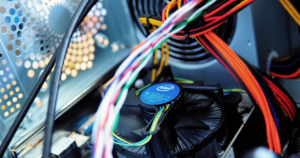The pestering sounds of a video card’s cooling fan can be maddeningly loud. After all, it is meant to cool down the device!
But what if you could silence your GPU forever? Would you do it? Let us plunge into the depths of madness and find out!
Silence Your GPU: The Good
It may not seem like the prime location to fix an issue with your graphics card, but oftentimes locating a loose screw or separating a clogged air vent will yield remarkable dividends.
If you’re feeling industrious and want to try some DIY-style repairs, consider investing in a can of compressed air to help dislodge any obstructions within the cooling system.
The Bad
The mere fact that GPU-intensive games like Destiny 2 are so prevalent on the market is a testament to their flexibility. As such, it’s not uncommon for players who experience graphics card issues to encounter this game among others as possible solutions!
Even though GPUs’ components are individually complex and sophisticated, they usually reside within one larger unit known as the ‘graphics processing unit’. GPUs have evolved rapidly over recent years, giving rise to hot-plugging capabilities allowing them to be upgraded while in operation – however, this can lead to problems if not addressed properly! This may necessitate an additional driver installation when gaming; or even in some instances require replacing the entire unit altogether!
and The Ugly
Although far more preferable than hearing an ear-piercing pop or crackle, this noise is nonetheless unpleasant – yet it can be remedied.
Unrelenting buzzing emanating from within a graphics card’s heatsink may cause unease, but it’s not necessarily a sign of impending doom. Dusty heat pipes and clogged fins can accumulate eventually resulting in gappy contact between them which then causes audible chirping noises; however, at present, it doesn’t appear so!
Your GPU may well shriek out of control if it has become encased in a pliable material such as silicone or rubber; its insulation against heat could be inadequate causing overheating which would manifest itself as a deafening scream from the device.
If you have chosen the incorrect thermal paste for your GPU, then you could be experiencing issues with heating. This will result in excessive strain on your heatsink fan; should that fail to adequately cool down the processor – leading to sudden loud screeching noises!
Option 1: Use a Coffee Can to Silence Your Graphics Card
You can stifle any clamorous noises emanating from your GPU by draping a coffee can over its top vent.
Keep in mind, however: if you are using an older graphics card or one with an aluminum housing, some may experience issues with overheating should it be situated near a hot component (e.g. processor).
Option 2: Place a Spoon Under Your GPU
NVIDIA and AMD utilize a variety of different techniques to address thermal management, including placing a piece of aluminum directly beneath their GPU; however, should you encounter any issues related to this design choice like throttling or overheating when gaming on your PC?
If you’re experiencing these problems with your graphics card, then consider replacing it with an energy-efficient NVIDIA GeForce 910M or AMD Radeon R7 Graphics. This particular model is capable of running games in the less demanding 900MHz frequency range, which means that users may experience fewer periods where they must reduce processor usage – resulting in a more consistent gameplay experience!
Option 3: Silence Your Graphics Card with Something deceptively Simple
If your PC has been subjected to any type of abuse, such as jolting or slamming against a desk or anything along those lines – don’t fret! Using a cotton swab can quickly remedy the issue.
Once you’ve disassembled your graphics card and removed its heatsink, it’s time to position the swab between the fan and its heat sink (it’s best not to apply too much pressure here – that could result in overheating).
To effectively silence a noisy graphics card, you must be mindful of what is causing the decibels.
Option 4: Sandpaper the GPU Vibration Pad
If none of the above solutions successfully resolve your issue, then perhaps you should consider investing in a physical vibration pad. This device is designed to combat any unwanted movement that could be causing noise within your graphics card; it effectively dissipates any excess whirring or rattling!
These inexpensive pads can typically be procured for around $15-$20 USD ($20-25 CAD). It’s an affordable option if your wallet won’t allow for an additional component such as a fan cooler or mounting bracket.
Option 5: Clean Out the Dust in Your Graphics Card Cabinet
If your system has a spacious case and limited space for expansion cards, then it’s possible that dust or other unanticipated particles have infiltrated the interior of your computer. Remove any obstructions from within the cabinet and allow it to air out while you attend to other priorities – most notably upgrading!
To expedite matters, one could employ an inexpensive vacuum cleaner to sweep away loose debris. Alternatively, if more advantageous compared with power costs; don’t forget about a shop vac set-up with its own hose attachment! It can be accomplished quite easily by snapping one into place over the opening in order to remove any accumulated particulates as well as providing increased access for periodic cleaning as well as inspection purposes.
Silence Your GPU: The Bottom Line
Ultimately, how do you silence your GPU? The answer is simple: take action. It may not be possible to eliminate all the noise from your beloved gaming rig, but with careful attention and a few key optimizations – along with a little hardware maintenance – any noisy GPUs can become as quiet as an ant!
Are you plagued by excessive fan noise when gaming? Find out more about this issue and discover effective solutions in our guide on fixing noisy graphics cards!
Conclusion
It’s time to silence those noisy GPU fans once and for all, so let’s get started!
Your PC is a critical component that should be rigorously maintained. Regular maintenance can ensure optimum performance and extend its lifespan. Here are some essential tips on how to keep your system running optimally!
Optimize your RAM and CPU speed to enhance system performance. Upgrade your graphics card if possible – this will yield the most impactful results! Take advantage of free trials for any software or services before committing; likewise, install anti-virus software before installing any new programs so as not to impede their functionality.




